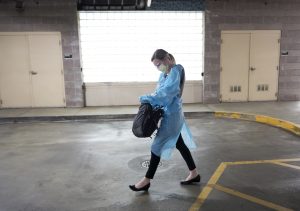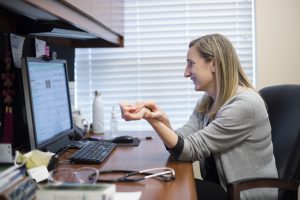CSP Team Note: This post was originally published on Novant Health’s Healthy Headlines. We thank them for allowing us to share it with you. To subscribe to Novant Health’s Healthy Headlines newsletter, click here. Click here to find a physician.Novant Health is also offering a self-guided assessment tool to help patients determine if they should seek care for COVID-19. (Note: This assessment is not a substitute for professional medical advice, diagnosis or treatment and should not be used if patients are experiencing a life-threatening emergency.)
How Novant Health is providing care in a pandemic
By Guest Blogger Gina DiPietro, Novant Health
The response to COVID-19 continues to shift the way Novant Health cares for its communities. While many nonessential surgeries and procedures are postponed, some appointments – such as prenatal and sick visits – cannot wait.
Across Novant Health, medical clinics have been adjusting hours, treating patients in parking lots and making other adjustments on the fly, all in the name of meeting patients where they want to be.
Virtual medical visits have met that need in a big way. Novant Health providers are seeing thousands of patients online, with more than 18,000 virtual visits from March 12-31.
In some cases, however, a patient may still need to come in – prompting new, creative health care solutions.
‘We like to fix things’
Perched in front of a computer at Novant Health Dilworth Pediatrics, Dr. Katherine Addison checks in with families online. One toddler, snuggled up in pink sweatpants alongside her mother, completes a 15-month wellness visit.
“With how worrisome and anxiety-promoting this time is, it’s been a silver lining with how gracious and appreciative families have been,” Addison said. “We’re dramatically changing what we’re doing. We can still provide really excellent care but also keep people at home.”
Addison’s second virtual visit prompts an in-person appointment – Sailor and Silas Martin need testing for strep throat, so dad Ben brings them by the clinic. The pediatrician meets the family at the car, keeping potentially sick patients out of the waiting room.
“It’s a lot easier than having to take them inside,” Ben Martin said. “And a lot more sanitary.”
The appointment is quick and easy – taking only minutes. (Note: Addison wears personal protective equipment with every patient due to the ongoing COVID-19 pandemic.) Another patient needs stitches removed and must come inside. In these instances, the clinic has separate office hours and entrances for sick and well patients.
Similar modifications are in place at Novant Health Pediatrics Highland Creek. Sick patients are seen seven days a week – keeping people who don’t feel well out of other clinics.
“There’s a lot of energy right now – a lot of collaboration, creativity and ingenuity,” Addison said. “Doctors tend to be problem solvers and we like to fix things for people. This is a huge challenge, because there’s not an easy answer and there’s not a quick fix. But I think it’s really inspired that aspect of all of us.”
Babies don’t stop for the coronavirus
At some OB-GYN clinics, doctors are meeting expecting mothers in parking lots to check fetal heart rates, said Dr. Pam Oliver, an executive vice president of Novant Health and president of the Novant Health Physician Network.
Keeping as many people as possible out of the office is also the goal for Jennifer Greenly, a clinic administrator at Novant Health WomanCare in Winston-Salem, Clemmons and Kernersville. Greenly said many recent appointments were converted into virtual visits. They’ve taken other steps to keep expectant mothers healthy, as well.
“We put a screener at our front door so that no one we suspect of any illness, flu included, gets into our clinic without our awareness,” Greenly said. “Patients who are concerned about being out in public have been very appreciative of that.”
Novant Health WomanCare has also consolidated its clinics and is only seeing patients in Winston-Salem – rotating the team to work two weeks on and two weeks off.
“We hope to keep at least half of our team well at any given time,” Greenly said.
At other clinics, team members are meeting patients outside to for pulse oximeter, or pulse ox, readings that detect the saturation of oxygen in the blood. It’s an important measure of how well the heart is pumping oxygen through the body.
Novant Health
Healthy Headlines
Facebook
Instagram
Twitter
YouTube






